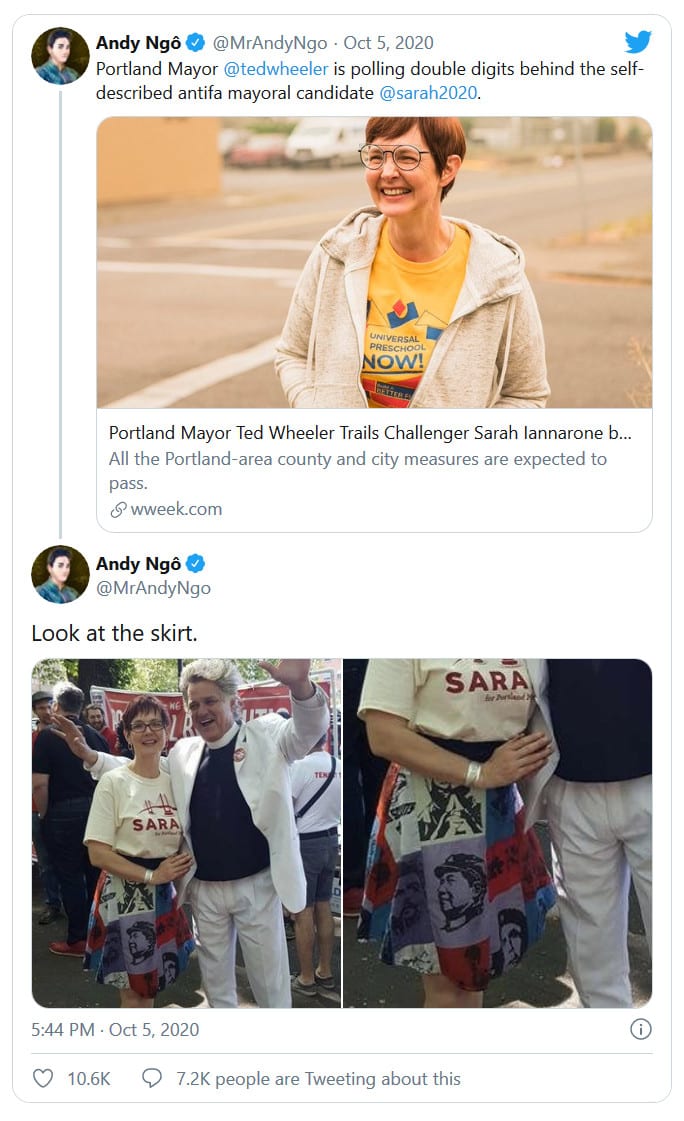CAPITALISM: THE REALLY UNKNOWN IDEAL IN PORTLANDIA: Everything you need to know about Portland’s likely new socialist mayor can be found by looking at how she views “your” money.
I put “your” in scare quotes because it’s not entirely clear Portland mayoral candidate Sarah Iannarone believes it’s actually yours.
As a reminder, we’re talking about this Sarah Iannarone.
* * * * * * * *
Anyway, to really understand Iannarone, you have to understand her view of your money, and to do so I’m going to dissect one section from her “Housing For All” plan.
“There is a significant amount of money available across the spectrum of housing options flowing into the city from various pipelines…”
I like this visual, a pipeline. Sucking money from my wallet. (Although it is a bit surprising as I thought progressives were against pipelines.)
Note also that this money is “available.” Sounds kind of benign, like picking daisies from an open field, only it’s your field, and armed government agents have come to pick them.
“There is significant tax inequity between property owners in East Portland and the rest of the city that needs to be evaluated and corrected through assessment recalibration and possible implementation of a land value tax (LVT).”
“Tax inequity” that must be “evaluated” so as to have a “recalibration.”
Hint: your taxes are going up, confiscatorily.
Well, unless you live in East Liberty which houses most of Portland’s minority population and tends to suffer from higher poverty rates. Iannarone’s fondness for a Land Value Tax kind of gives away her agenda.
In other news from Portlandia, a Grauniad columnist discovers that the city wasn’t the socialist pipe dream she was expecting: We left the UK for Portland expecting a liberal dream. That wasn’t the reality. Unexpectedly!
The first surprise was the lack of non-white people. I later discovered that the 2010 census found Portland to be the whitest big city in the US. When our daughter started daycare, she came home and said she didn’t like her brown skin; she wanted to be white like the other kids. She was three. I felt like a fool for moving her out of a city where she would have been surrounded by people who look like her.
Living in Portland was also the first time I felt noticed for being in a mixed-race marriage. In rural Oregon, where you now regularly see Trump signs and bumper stickers, it’s become an unsaid agreement between my husband and I that I get out of the car as little as possible. He goes into the gas stations; he checks us into motels. I was horrified but not surprised when, during the fires, armed vigilantes set up “checkpoints” in small towns – claiming they were worried about “antifa looting”. They stopped drivers and asked them to identify themselves.
I write all of this as a brown person and a recent transplant. Racism for black people in Portland is far more pervasive and damaging. It’s visible in housing policy, police brutality and who gets to work where. In 1859, when Oregon joined the union, it was the only state to explicitly ban all black people living there. That legacy of racism has cast a long shadow. As recently as the 1990s, lenders in the state engaged in redlining (not giving people loans and mortgages because of where they live – which mainly affected the city’s small black population). There continues to be de facto racial segregation in schools. But, until this summer, Portland’s white population didn’t talk about it much.
Portland’s last Republican mayor served for a little over a year from September of 1979 to November of 1980. Prior to that, its last Republican mayor to serve a full term left office at the end of 1956. Why are Democrat monopoly cities such cesspits of racism?
(Classical reference in headline.)

